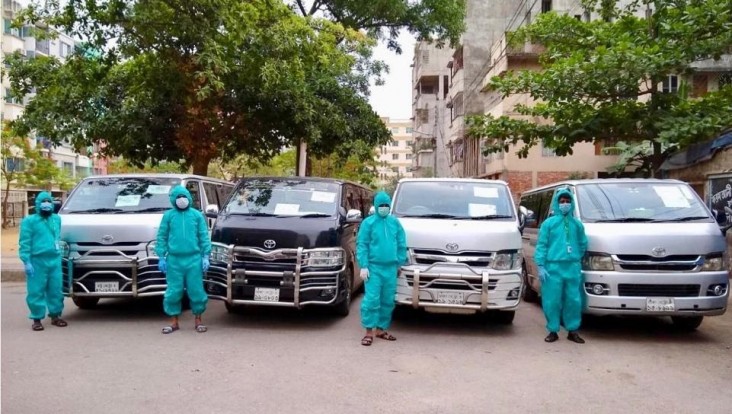Speeches Shim

Md. Habib, Md. Jahid, Md. Abual Hossen, and Md. Abul Hossain are four of the unsung heroes in Bangladesh’s rapid response to COVID-19. They are, quite literally, driving the response—every day, all over the capital city. They are the ones who suit up and help collect specimens to track the virus and keep others safe.
During the initial days of the pandemic, the Institute of Epidemiology, Disease Control and Research (IEDCR), one of the major units of the Directorate General of Health Services that leads the national response to COVID-19, was able to collect and transport all of the specimens from the limited number of suspected cases from surveillance sites to the testing laboratories. But when the virus started to spread, IEDCR faced challenges in coping with the expanding demand for specimen collection and transportation over a much larger area. In response, USAID provided four rented vehicles and drivers to support the IEDCR’s efforts.

By 7 a.m., Abul, Jahid, Abual, and Habib are up and ready to start their shifts. Each morning, they wash the vehicles with detergent and spray the interior with disinfectant. After each trip, they wipe the vehicles with disinfectant and make sure that hand soap or sanitizer is available in the vehicles for the sample collectors.
The drivers wait for the medical technologists and take them to different sites to collect samples from patients. It’s important work: Specimen collection for testing is crucial to quickly identify COVID-19 cases, conduct contact tracing, and isolate infected people to contain the spread of the virus within the community. Drivers play a central role in this team effort by transporting the samples and the professionals who collect them.
Their familiarity with routes and locations is invaluable, as they have to navigate Dhaka, the sprawling capital and home to 20 million people—and the area where most of Bangladesh’s cases thus far have been reported. Each day, a driver pulls into about ten different locations where the team collects an average of 35 samples.
The drivers are fully aware of the risks, but they gladly take on the challenge. “My job is to drive the vehicle, but I feel good that now I am driving for something that is very important for my country,” says Abul. The other drivers echo that same sentiment. Working long hours is required every day but they do not complain. They are proud to do their part, getting behind the wheel and speeding down Bangladesh’s road to a successful COVID-19 response.

Comment
Make a general inquiry or suggest an improvement.